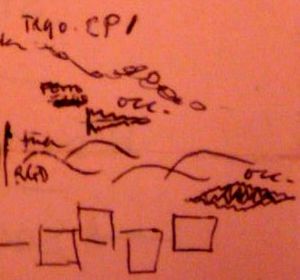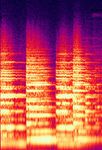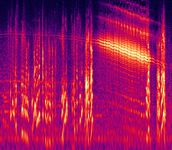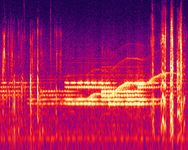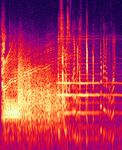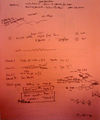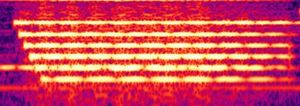Closed Planet
Delia created effects and backgrounds for a 1962 science fiction radio drama Closed Planet by John Hynam[1] for the BBC Light Programme.[2]
Contents
Copyright
Under UK law, audio recordings made before 1963 are in the public domain.[3]
Plot
A spaceship far from Earth is hit by meteors, one engine is damaged, and they obtain special permission, given the circumstances, to land on a planet where visits are not allowed from other civilizations.
They land on the planet and are visited by a high-up alien dignitary who tells them that they must not venture further than a certain distance from the ship or they will be destroyed.
While the crew is becoming paranoid about being watched by the aliens, a black african member of the crew steals one of the alien guard's vehicles, drives into town, complains about the drinks that they serve there, is arrested, runs from the police and is shot.
Meanwhile, back at the ship, our heroes follow the above events on "view-screens" and also discover that one of the only two women in the crew is missing, presumably stolen by the aliens. They attack the guards, steal another flycar and fly to the city to rescue her.
In the end, one of the crew members has a baby and the ship lifts off. (Sorry, I couldn't stand following the rest of it!)
Its Radio Times entry describes it as:
Time: Somewhere in the future
In the New Age interplanetary travel has become an everyday occurrence. and Time rather than Distance now sets the only limit on man's exploration of the universe. It seems, however, that Outer Space. like our own familiar world, also has secrets to hide, frontiers to guard, "security" zones to protect. Such a place is the "closed" planet, and only dire necessity may excuse the deliberate infringement of its astral neutrality by visitors from Earth.
Scenes
Most of Delia's backgrounds start with a musical effect which then fades into the background sound for the scene, lasting throughout it and punctuating the dialogue.
Dividing it into sections with different (or no) Delian backgrounds:
- 00:00-07:10 Opening and meteor hit to the spaceship (Spaceship interior background, a whistle)
- 07:10-08:10 Records Office interior (hum with tremolo)
- 08:10-10:52 Working on the engines (as above with noise and computer beeps and internals)
- 10:52-19:34 Orbiting the planet
- 19:34-24:26 The ambassador's visit to the spaceship
- 24:26-30:11 First moments on the planet surface (no background)
- 30:14-32:07 Consternation and alarm
- 32:07-45:37 Listening to police radio (no background)
- 45:37-48:18 Flycar takeoff, interior background and landing
- 48:18-55:32 On the planet surface (filtered noise then silence)
- 55:32-57:23 "Look at this tiny child here", ship takeoff and closing.
Extracts
- Opening
"Very high and eerie, desc. semitones, down to steady far mar[?]. Moving forward - higher and further."[4]

- Meteor warning and strike
- Chords "This is understood"
- Ship landing
- Arrival of the ambassador's flycar
- Good Night
- Flycar takeoff
- Flycar landing
- Ship takeoff and outro
Papers
Delia's papers contain:
- Two pink pages of notes, paperclipped together, listing what's on each of the four makeup tapes and with notes for Time On Our Hands.
- Two yellow pages of notes and diagrams, stapled together, listing the effects she was to create and their internal structure
DD161912: Pink notes, page 1
DD161932: Pink notes, page 2
DD162002: Yellow notes, page 1
DD162024: Yellow notes, page 2
Tapes
Delia constructed it on four makeup tapes[5] using the TR90, Ferrograph and RGD tape recorders and the Keying Unit.
- Tape 1: basic inc- high sine
- Band 1: single [][6] notes + f.b. - approx. 1 per 6"
- Band 2: .,.-./\/\.-.,. rand. & Doppler - approx. 1 per 15"
- Band 3: cont. high sine + f.b.
- Band 4: low blocks
- Tape 2:
- Tape 3: first mix with [][6]
- Tape 4:
- Band 1: loud bass distortion
- Band 2: q.u.[?]
- Band 3: filthy
- Band 4: good (first mark[?] now on tape 2) using the Ferrograph, TR90 and KU.
Analysis
The element that it has in common with Time On Our Hands is a spread chord of six notes, each a whole tone distant from the previous one, most evident in the Opening, in "Good night" and in the Closing. The order of note presentation is different here, but the chord is the same.
Availability
- Broadcast on 24 October 1962 at 20.31 on the Light Programme.[1]
- Its rebroadcast as episode 49 of American radio series "SciFi Friday" is archived in the Old Time Radio Researchers Library, of which the play itself runs from 02:09.00 to 59:32.12.
